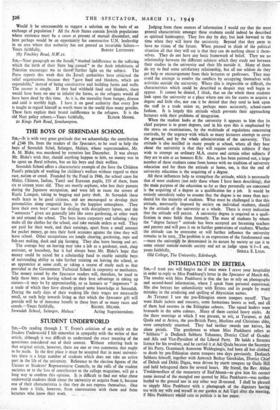STUDENT UNDERWORLD
Sta,—On reading through J. T. Evans's criticism of an article on the Student Underworld I felt somewhat in sympathy with the writer of that article, although it was difficult to understand the exact meaning of the quotations considered out of their context. Without referring back to that original article, however, there are one or two comments that ought to be made. In the first place it must be accepted that in most universi- ties there is a large number of students which does not take an active part in the life of the university. Reference to the election figures of the Unions or Students' Representative Councils, to the rolls of the student societies or to the lists of contributors to the college magazines, will go a long way to confirm this opinion. It is difficult to find out what ,these underworld students think about the university or acquire from it, because one of their characteristics is that they do not express themselves. One can learn a little, however, from conversation with them and from lecturers who know their work.
Judging from these sources of information I would say that the most general characteristic amongst these students could indeed be described as spiritual bankruptcy. They live day by day, but look forward to the time when they will leave the university. Beyond that they seem to have no vision of the future. When pressed to think of the political situation all that they will say is that they can do nothing about it them- selves. They do not have any basic framework of belief. They see no relationship between the different subjects which they study nor between their studies in the university and their life outside it. Many of them do try to find some satisfactory relationship, but all too seldom do they get help or encouragement from their lecturers or professors. They-may avoid the attempt to resolve the conflicts by occupying themselves with activities outside the university. Where this is impossible or difficult, the characteristics which could be described as despair may well begin to appear. It cannot be denied, I think, that on the whole these students look upon the university as a place where one sits for exams to acquire a degree and little else, nor can it be denied that they tend to look upon the staff in a trade union or, perhaps more accurately, school-room fashion. It is largely this attitude which prevents their approaching lecturers with their problems of integration.
When the student looks at the university it appears to him that its chief purpose is to grant degrees, and in his eyes this is emphasised by the stress on examinations, by the multitude of regulations concerning curricula, by the urgency-with which so many lecturers attempt to cover the ground, and by the whole administration of the university. This attitude is also instilled in many people at school, where all they hear about the university is that they will require certain subjects if they wish to attempt an ordinary M.A. course and certain other subjects if they are to aim at an honours B.Sc. Also, as has been pointed out, a large number of these students come from homes with no tradition of university education and for them the attitude at home, too, is that the end of university education is the acquiring of a degree.
All these influences help to strengthen the attitude, which is necessarily that of most students (not only those whom I have been describing), that the main purpose of the education so far as they personally are concerned is the acquiring of a degree as a qualification for a job. It would be entirely unrealistic today to assume that the degree is no more than inci- dental for the majority of students. What must be challenged is that this attitude, necessarily imposed by society on individual students, should be the attitude of the university as a whole. There is every indication that the attitude will persist. A university degree is required as a quali- fication in more fields than formerly. The mass of students by whom the " degree factory " attitude has been. accepted are becoming teachers and parents and will pass it on to further generations of students. Whether the attitude can be overcome or will further influence the university remains to be seen. The problem is an expression of the fundamental one —must the university be determined in its nature by society or can it to some extent remain -outside society and act as judge upon •it ?—I am,
yours faithfully, SHEILA S. LYON. Old College, The University, Edinburgh.






































 Previous page
Previous page